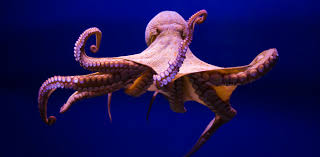It’s easy to fall for something that’s cute, cuddly and koala-like. An octopus might be a bigger challenge.
Almost 2,000 years ago, Pliny, a Roman commander/philosopher. said: “No animal is more savage.” As recently as 20 years ago, writer Sy Montgomery told the Television Critics Association, people “thought: ‘Aren’t they monsters? Aren’t they gross?’”
They do look odd, but they also have remarkable skills and personalities And now, as researcher Christine Huffard put it: “Octopuses are having a moment.”
There was the fictional Hank in “Finding Dory” and real-life creatures in PBS’ “Octopus: Making Contact” (2019) and the Oscar-winning “My Octopus Teacher” (2020). Next is an Earth Day documentary mini-series from James Cameron.
“I’ve always had the octopus in very high regard,” Cameron, the “Titanic” and “Avatar” writer-director, told the TCA. “I always imagined that when that flying saucer lands on the White House lawn, and the ramp comes down, (the alien) looks liike an octopus.”
His three-part “Secrets of the Octopus” debuts at 8 p.m. Sunday (April 21, the eve of Earth Day) on the National Geographic Channel. It repeats at 10:52 p.m. that night and from 7:08-10 p.m. Monday (Earth Day).
Here is a creature that feels other-worldly. It has “a brain that’s a ring around his throat and blue blood and three hearts,” said Montgomery, author of the “Secrets of the Octopus” companion book (2024, National Geographic). It’s “able to change color and shape and spit venom and shoot ink. But you can be friends with an octopus.”
Like Cameron’s previous “Secrets of the Elephants” (rerunning from 4:13 to 8 p.m. Sunday and 9:50 a.m. to 12:50 p.m. Monday), this was an ambitious effort. It was filmed in five countries, producer Adam Geiger said, ranging from ocean depths to the shore. “Octopuses have basically conquered from the deep sea right up to the shallows.”
They’re often nearer than people realize, said Alex Schnell, a researcher working on the film. “Finding an octopus is incredibly difficult, because they can just blend into any background …. I’m looking for things that look like a rock or a bumpy piece of algae.”
Once she finds an octopus, Schnell must wait – sometimes days – for it to respond. “The thing that constantly fascinated me is their incredible ability to trust.”
They have every reason to be cautious, Schnell said. “They’re a big ball of protein. They would make a juicy meal for anything.” So they change their”
— Color, “changing color in a fifth of a second,” said producer Maria Wilhelm.
— Texture. “They can look as smooth as a rock and then, one second later, as bumpy as a piece of algae,” Schnell said. One type “can change body patterns 270 times an hour.”
— Or shape. As Montgomery put it: “There are octopuses who can say, ‘I’m not an octopus, I’m a poisonous flatfish. No, I’m a venomous lionfish. Wait …’
This also works for attack, she said. “They will even lie to their prey … ‘Don’t mind me, I’m just a passing cloud.’” Then the “cloud” becomes a clever, eight-limbed conquerer.

The octopus becomes an Earth Day star
It’s easy to fall for something that’s cute, cuddly and koala-like. An octopus might be a bigger challenge.
Almost 2,000 years ago, Pliny, a Roman commander/philosopher. said: “No animal is more savage.” As recently as 20 years ago, writer Sy Montgomery told the Television Critics Association, people “thought: ‘Aren’t they monsters? Aren’t they gross?’”
They do look odd, but they also have remarkable skills and personalities And now, as researcher Christine Huffard put it: “Octopuses are having a moment.”
There was the fictional Hank in “Finding Dory” and real-life creatures in PBS’ “Octopus: Making Contact” (2019) and the Oscar-winning “My Octopus Teacher” (2020). Next is an Earth Day documentary mini-series from James Cameron. Read more…